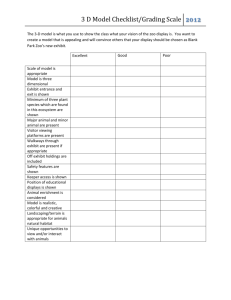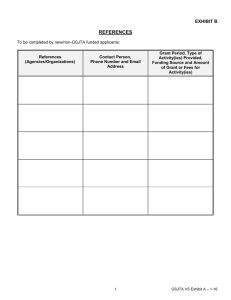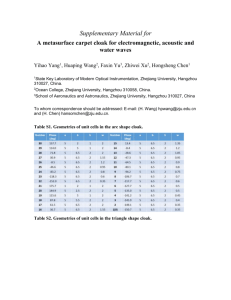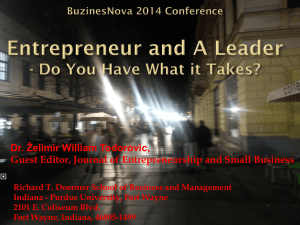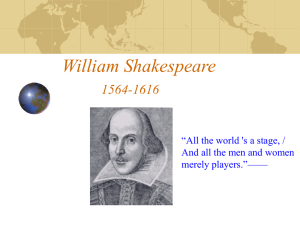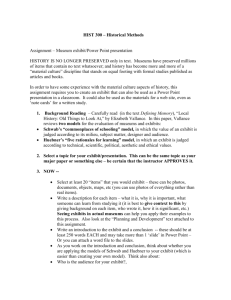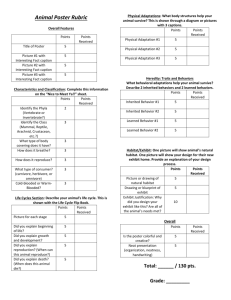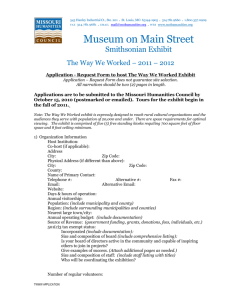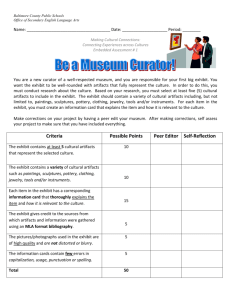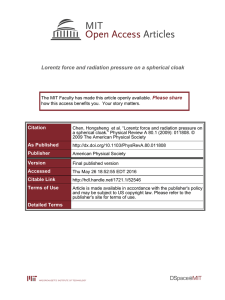Church History Museum Fun Facts
advertisement
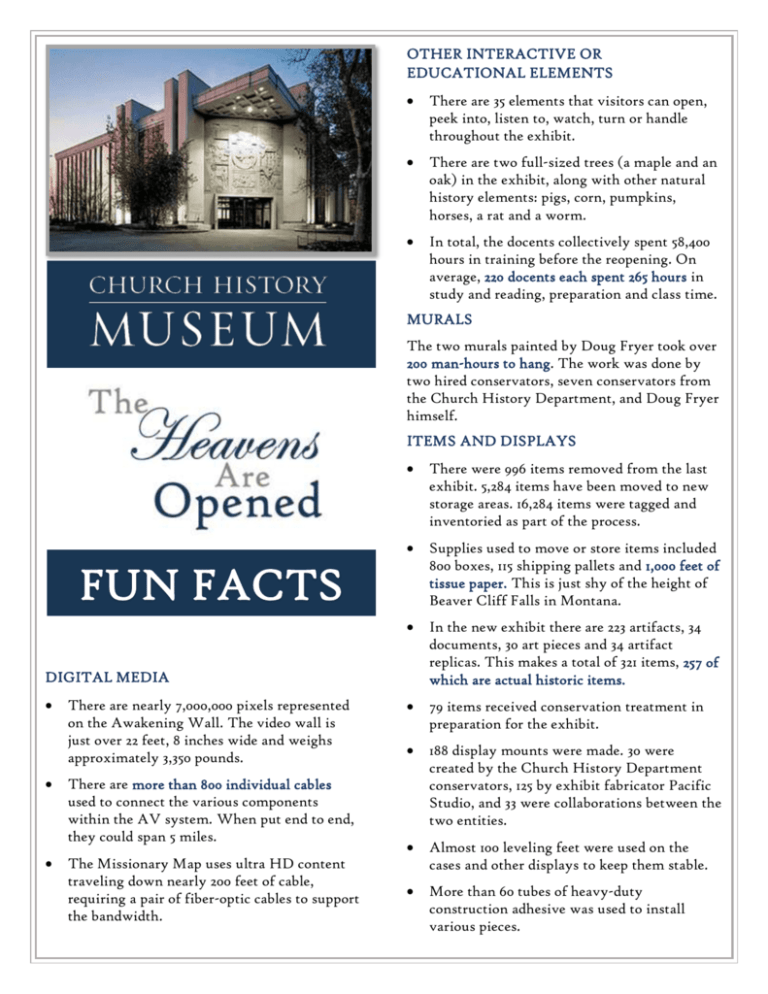
OTHER INTERACTIVE OR EDUCATIONAL ELEMENTS There are 35 elements that visitors can open, peek into, listen to, watch, turn or handle throughout the exhibit. There are two full-sized trees (a maple and an oak) in the exhibit, along with other natural history elements: pigs, corn, pumpkins, horses, a rat and a worm. In total, the docents collectively spent 58,400 hours in training before the reopening. On average, 220 docents each spent 265 hours in study and reading, preparation and class time. MURALS The two murals painted by Doug Fryer took over 200 man-hours to hang. The work was done by two hired conservators, seven conservators from the Church History Department, and Doug Fryer himself. ITEMS AND DISPLAYS There were 996 items removed from the last exhibit. 5,284 items have been moved to new storage areas. 16,284 items were tagged and inventoried as part of the process. Supplies used to move or store items included 800 boxes, 115 shipping pallets and 1,000 feet of tissue paper. This is just shy of the height of Beaver Cliff Falls in Montana. In the new exhibit there are 223 artifacts, 34 documents, 30 art pieces and 34 artifact replicas. This makes a total of 321 items, 257 of which are actual historic items. 79 items received conservation treatment in preparation for the exhibit. 188 display mounts were made. 30 were created by the Church History Department conservators, 125 by exhibit fabricator Pacific Studio, and 33 were collaborations between the two entities. Almost 100 leveling feet were used on the cases and other displays to keep them stable. More than 60 tubes of heavy-duty construction adhesive was used to install various pieces. FUN FACTS DIGITAL MEDIA There are nearly 7,000,000 pixels represented on the Awakening Wall. The video wall is just over 22 feet, 8 inches wide and weighs approximately 3,350 pounds. There are more than 800 individual cables used to connect the various components within the AV system. When put end to end, they could span 5 miles. The Missionary Map uses ultra HD content traveling down nearly 200 feet of cable, requiring a pair of fiber-optic cables to support the bandwidth. Approximately 700 feet of new electrical track were installed. CREATING THE ENVIRONMENT Over 3,000 pounds of specialty concrete were used to create the Liberty Jail floor. Nearly 1,200 linear feet of hardwood was used to create the interiors of the Smith and Whitmer cabin walls. That’s about five times the length of a Boeing 747 airplane (231 feet, 10 inches). Over 100 gallons of paint were used to create the finishes for the exhibits. 350 new LED track heads light the new displays. THE VISION THEATER The Vision Theater has 103 acoustical springs attached to the ceiling to create a floating sound isolation lid. The Vision Theater has a viewing angle of 220 degrees. Actual ambience sounds were recorded in the Sacred Grove using a specialized 13-channel microphone setup, which captured seven upper channels of audio, five lower channels, and an LFE channel at the same time. There are 204 channels of audio in the theater. Producers had to create 20 different digital trees and use over 750 different roto shapes to trace the trees to be able to add the effects to them. There are over 250 different versions of film shots. The aspect ratio of the projection screen in the Vision Theater is 6.14:1. This is almost four times wider than typical high definition televisions. WHITMER QUILT REPRODUCTION Approximately 1,500 hours of work went into reproducing a quilt from the Whitmer family. The reproduction is valued at about $20,000. JOSEPH SMITH’S CLOAK The mounting of the cloak for a long-term exhibit was of great concern. The weight of the cloak could cause its own damage. Some of the special features of this mount that minimize damage include: 1. A solid block of polyethylene foam mount hand-carved to match the contours of the cloak. 2. 22 rare earth magnets that hold additional padding in place to ensure that the folds do not crush the fabric. 3. A curved false wall created to nestle behind the cloak and support the back. The entire mount took over 260 hours to create. (That does not include the design phase.) THE NAUVOO SUNSTONE Moving the sunstone into the museum required 11 workers over 3.5 hours. The weight of the sunstone is estimated at 3,300 pounds. Over 400 pounds of sand were used to create the faux stone ledges in the Nauvoo gallery. GENERAL DESIGN Electrical engineering team of seven worked a total of 1,925 hours. Architectural and interior design team of 23 put in a grand total of 6,425 hours. Acoustical engineering team of two worked 140 hours. Mechanical and structural engineering included 10 people working a total of 780 hours.
